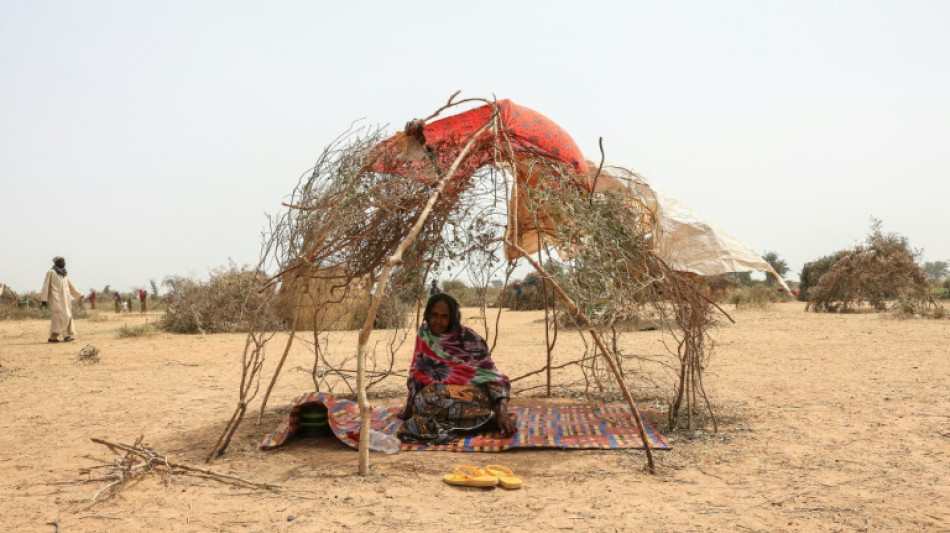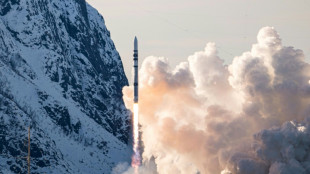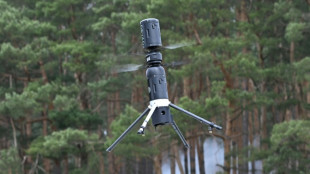
-
 Saka 'ready to go' after long injury lay-off: Arteta
Saka 'ready to go' after long injury lay-off: Arteta
-
Ingebrigtsen Sr, on trial for abusing Olympic champion, says he was 'overly protective'

-
 Tourists and locals enjoy 'ephemeral' Tokyo cherry blossoms
Tourists and locals enjoy 'ephemeral' Tokyo cherry blossoms
-
Khamenei warns of 'strong' response if Iran attacked

-
 France fines Apple 150 million euros over privacy feature
France fines Apple 150 million euros over privacy feature
-
UK PM urges nations to smash migrant smuggling gangs 'once and for all'

-
 Thai authorities probe collapse at quake-hit construction site
Thai authorities probe collapse at quake-hit construction site
-
France's Le Pen convicted in fake jobs trial

-
 Chinese tech giant Huawei says profits fell 28% last year
Chinese tech giant Huawei says profits fell 28% last year
-
Trump says confident of TikTok deal before deadline

-
 Myanmar declares week of mourning as hopes fade for quake survivors
Myanmar declares week of mourning as hopes fade for quake survivors
-
Japan's Nikkei leads hefty market losses, gold hits record

-
 Tears in Taiwan for relatives hit by Myanmar quake
Tears in Taiwan for relatives hit by Myanmar quake
-
Venezuela says US revoked transnational oil, gas company licenses

-
 'Devastated': Relatives await news from Bangkok building collapse
'Devastated': Relatives await news from Bangkok building collapse
-
Arsenal, Tottenham to play pre-season North London derby in Hong Kong

-
 Japan's Nikkei leads hefty equity market losses; gold hits record
Japan's Nikkei leads hefty equity market losses; gold hits record
-
Israel's Netanyahu picks new security chief, defying legal challenge

-
 Trump says US tariffs to hit 'all countries'
Trump says US tariffs to hit 'all countries'
-
Prayers and tears for Eid in quake-hit Mandalay

-
 After flops, movie industry targets fresh start at CinemaCon
After flops, movie industry targets fresh start at CinemaCon
-
Tsunoda targets podium finish in Japan after 'unreal' Red Bull move

-
 French chefs await new Michelin guide
French chefs await new Michelin guide
-
UK imposes travel permit on Europeans from Wednesday

-
 At his academy, Romanian legend Hagi shapes future champions
At his academy, Romanian legend Hagi shapes future champions
-
Referee's lunch break saved Miami winner Mensik from early exit

-
 Djokovic refuses to discuss eye ailment after shock Miami loss
Djokovic refuses to discuss eye ailment after shock Miami loss
-
Mitchell magic as Cavs bag 60th win, Pistons and T'Wolves brawl

-
 Mensik shocks Djokovic to win Miami Open
Mensik shocks Djokovic to win Miami Open
-
Duterte lawyer: 'compelling' grounds to throw case out

-
 What happens on Trump's 'Liberation Day' and beyond?
What happens on Trump's 'Liberation Day' and beyond?
-
Clock ticks on Trump's reciprocal tariffs as countries seek reprieve

-
 Japan-Australia flagship hydrogen project stumbles
Japan-Australia flagship hydrogen project stumbles
-
Musk deploys wealth in bid to swing Wisconsin court vote

-
 Mensik upsets Djokovic to win Miami Open
Mensik upsets Djokovic to win Miami Open
-
China manufacturing activity grows at highest rate in a year

-
 'Waited for death': Ex-detainees recount horrors of Sudan's RSF prisons
'Waited for death': Ex-detainees recount horrors of Sudan's RSF prisons
-
Japan's Nikkei leads big losses in Asian markets as gold hits record

-
 Rescue hopes fading three days after deadly Myanmar quake
Rescue hopes fading three days after deadly Myanmar quake
-
'Basketbrawl' as seven ejected in Pistons-Wolves clash

-
 Four men loom large in Microsoft history
Four men loom large in Microsoft history
-
Computer pioneer Microsoft turns 50 in the age of AI

-
 Trump calls out both Putin and Zelensky over ceasefire talks
Trump calls out both Putin and Zelensky over ceasefire talks
-
Kim Hyo-joo tops Vu in playoff to win LPGA Ford Championship

-
 Economy and especially Trump: Canadians' thoughts on campaigns
Economy and especially Trump: Canadians' thoughts on campaigns
-
Liberal PM Carney takes lead four weeks before Canada vote

-
 SpaceX to launch private astronauts on first crewed polar orbit
SpaceX to launch private astronauts on first crewed polar orbit
-
Australia open door for Kerr's return as Matildas captain

-
 The Premier League's unlikely pretenders to Champions League riches
The Premier League's unlikely pretenders to Champions League riches
-
IFabric Corp Reports Record Q4 and Full Year 2024 Revenues and Strong Profitability


In Cameroon's arid north, climate stress boosts ethnic strife
Their homes are a scattering of huts made of branches and dry leaves that seem to almost dissolve into the arid landscape.
A group of men sit on a rug, conversing in the shade of a tree, while women perching on stones under the scorching Sahel sun prepare a meal with the few ingredients they have to hand, as children play nearby.
These are some of the 4,000 ethnic Arabs in a makeshift camp at Bogo in Cameroon's Far North region.
They fled after violence erupted near Kousseri, a river town about 100 kilometres (60 miles) from Lake Chad.
The fighting flared in August, then again in December, pitting Choa Arab herders against Mousgoum fishermen in a fight over access to water, a precious but dwindling resource in this region.
The Mousgoum dig pools to capture water and keep fish -- a practice that often causes friction with Arab herders seeking water points for cattle, but which this time spiralled out of control.
At least 67 people died and hundreds were injured, the town's cattle market was destroyed and around 100,000 people fled.
Many crossed into neighbouring Chad or headed towards Maroua, the Far North's capital, lying more than 800 kilometres (500 miles) northeast of the capital Yaounde.
Mahamat Sale, 60, is the leader of the group in Bogo, who say they walked some 175 kilometres (110 miles) to reach a place they consider safe. They have lost everything.
"We prefer to stay here rather than go back," said Sale. "Here, we are tolerated. Over there, the Mousgoums consider us to be invaders."
- Climate stress -
Rising temperatures and scarcer, more unpredictable rainfall are acknowledged factors in inflaming ancestral tensions in the Lake Chad area.
In a 2019 report, the Europe-based think tank Adelphi warned of "a feedback loop" -- a vicious circle, in non-technical speech -- between climate change and conflict dynamics.
Climate stress increases pressure on communities, which undermines their ability to cope.
This in turn makes those communities more vulnerable to climate impacts and heightens competition for resources.
Armel Sambo, a professor of history at the University of Maroua, said "When the economic situation deteriorates, people fall back on their ethnicity, religion and identity issues," inflaming the risk of violence.
"Historically, the Mousgoums are the natives and the Arabs are nomadic herders, regarded as people who come along and occupy the land as intruders."
Lake Chad is an expanse of shallow water and swamps that at one time was the size of Lake Erie, extending its shores to four countries — Cameroon, Chad, Niger and Nigeria.
But it has lost more than 90 percent of its surface area in six decades, reduced from 26,000 square kilometres (10,000 square miles) in 1963 to less than 1,500 square kilometres today.
Increased irrigation and human demand for freshwater, along with less rainfall, have driven the shinkage.
The lake basin and its countless islets have also become the main haven for jihadist fighters from Nigeria's Boko Haram and its dissident branch, the Islamic State in West Africa Province (ISWAP), but the Kousseri area has thus far been spared from their attacks.
- Solutions -
At a village near Kousseri, Mahamat Djidda Mahamat, a 20-year-old resident, said the situation had calmed down after last year's clashes.
"I don't know if it's over. I lost my father, my house, loved ones... I just want to live in peace," he said, adding that he avoided the Arabs.
"People are going home. We have secured the area," said Bakari Midjiyawa, the governor of the Far North region.
But, said Sambo, what was needed was a long-term system of water allocation and mediation so that disputes between herders and fishermen did not turn bloody.
"Efforts are being made but are not enough," he said.
"Seasonal livestock trails should be marked out, water points should be created for each community and there should be monitoring to ensure proper application of these measures," he said.
"The government must become more involved, ensure the safety of movements of people in this region and promote mediation by traditional chiefs."
More widely, the disappearance of Lake Chad -- a hypothesis deemed credible by experts -- would deprive millions of water needed to survive through fishing, agriculture, livestock and trade.
"The effects of global warming and the problems of access to water have catalysed tensions," said Xavier Bourgois, spokesperson for UNHCR, the UN's refugee agency.
"Now we must bring all the players around the table to find the roots of the problem and put in place solutions for adapting."
P.Silva--AMWN

